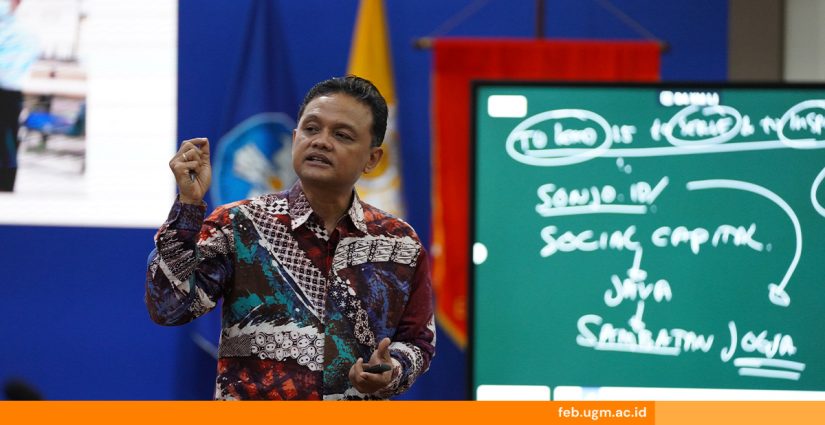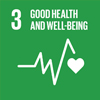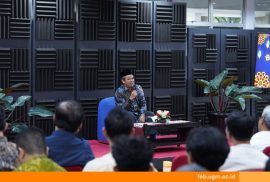
Indonesian society is widely known for its culture of cooperation. Among the Javanese community, the term “sambatan” is a tradition of helping others without monetary reward. For example, when building a house, residents will help by providing labor assistance. This culture eventually inspired Rimawan Pradiptyo, S.E., M.Sc., Ph.D., Chairman of the Department of Economics FEB UGM, to initiate a social movement called Sambatan Jogja, also known as SONJO.
In front of dozens of students from various countries who participated in the Global Summer Week 2025 on Wednesday, July 16, 2025, at FEB UGM, Rimawan shared stories about the background of the establishment of SONJO. During the Covid-19 pandemic, many people experienced difficulties, but the limitations of physical interaction hampered efforts to help each other. Amid these conditions, he envisioned a form of ‘sambatan’ or a way to help others that did not require in-person meetings. Emerging from these values, SONJO emerged as a social solidarity initiative based on collaboration without physical contact.
SONJO was officially established on March 24, 2020, and operates in Yogyakarta. Communication among its members is primarily conducted through WhatsApp Groups (WAGs), which have since grown to include more than 30 active groups. The decision to use WhatsApp as a communication platform stemmed from the fact that most Indonesians are already familiar with and frequently use the app for everyday communication.
SONJO’s ability to function without relying on financial resources sets it apart. As Rimawan explains, providing aid does not always require money, it can also be done through social capital, such as trust, cooperation, and solidarity. SONJO was formed to support vulnerable groups and communities impacted by the pandemic, while upholding the values of integrity, transparency, empathy, and synergy as a foundation for social capital mobility.
Although first founded to respond to the COVID-19 crisis in Yogyakarta, by 2023, SONJO had shifted its focus toward another pressing issue, the regional waste crisis. Today, the movement has grown to include more than 2,300 active members participating across various programs.
To carry out its mission of supporting those affected by the pandemic, SONJO launched a range of initiatives. In the economic sector, it developed programs such as SONJO Pangan Database (a directory of grocery stores, traditional markets, and food vendors), SONJO Ngabuburit (promoting food vendors during the month of Ramadan), Etalase Pasar SONJO (a digital storefront for MSMEs), and SONJO HampersFest (promoting festive hampers). Other initiatives included SONJO Jagong (promoting health protocols at weddings and community events), SONJO Ekspor (supporting MSMEs in exporting their products), SONJO PasarDesa (logistics distribution through local markets), and SONJO Catering (providing meals for individuals in isolation).
To support the digital transformation of MSMEs, SONJO also organized digital marketing training, covering topics such as logo creation, product photography, poster design, and online promotion strategies. Moreover, SONJO launched a web-based application allowing MSMEs to showcase their products and business contact information, with a WhatsApp ordering feature to facilitate transactions.
Meanwhile, in the health sector, SONJO initiated thirteen programs. These included SONJO Poster (online dissemination of COVID-19 information), SONJO Husada (distribution of PPE and medical supplies), SONJO Inovasi (supporting innovators developing healthcare tools), SoHibKoe (volunteer registration for plasma donation), and SONJO Husada Tangguh (fundraising for COVID-19 shelters and support volunteers). They also managed databases such as SiTangguh Shelter Database (monitoring shelter facilities) and SISTERKU (tracking patients in isolation), and coordinated volunteers through SONJO Saras to assist in shelter supervision. Programs like LiveDokter offered teleconsultation services, while SONJO Uwuh launched a pilot project for managing medical waste. SONJO Rukti Jenazah assisted in the burial of COVID-19 victims, and SONJO Rewangan that functioned as an alternative referral system for patient transfers.
Although hospitals had referral systems, SONJO Rewangan offered a faster and more flexible alternative. This system applied a double auction model, in which “sellers” (hospitals) and “buyers” (patients or their families) each submitted their needs and capacities. Through this program, SONJO Rewangan successfully facilitated over 150 patient transfers within its first week of implementation.
Another flagship program was SONJO Tetuko, a mass vaccination initiative that adapted its approach depending on whether it was implemented in urban or rural areas. The program’s success was notable, with the then Minister of Health praising SONJO Tetuko as the most cost-efficient mass vaccination initiative, with an operational cost of only Rp6,000 per person.
SONJO shows that substantial social capital and deep cultural roots can deliver aid continuously without physical presence or significant funding. Through its inclusive and adaptive digital approach, SONJO stands as living proof that solidarity can thrive even among individuals who have never met, as long as they share common values and a mission.
Rimawan explained that a crisis like the Covid-19 pandemic is like playing an endless game, where the endpoint is unknown. Under these conditions, making decisions with a long-term perspective is important. He emphasized the importance of the delta-sigma-delta approach, namely by taking small actions consistently every day without stopping.
“Because it is from consistency that big changes can happen,” concluded Rimawan.
Report by: Najwah Ariella Puteri
Editor: Kurnia Ekaptiningrum
Sustainable Dvelopment Goals










